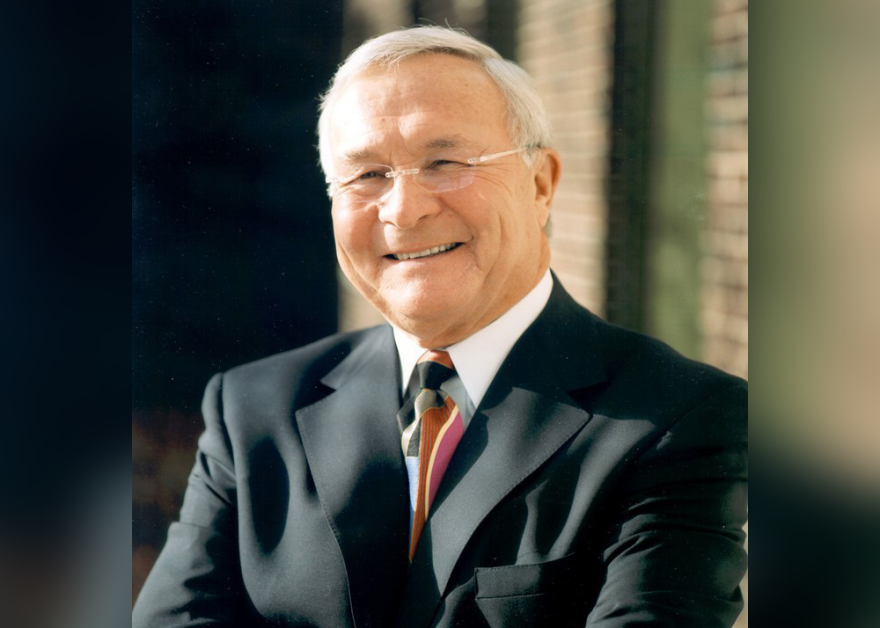Longtime Oakland County Executive L. Brooks Patterson died on Saturday at age 80. His political career spanned five decades.
Patterson leaves a formidable but polarizing legacy.
To some, he was a principled, no-nonsense leader with a blunt wit, who embodied the essence of good government. To others, he was a divisive figure who fanned the flames of racial and geographic tensions, and held southeast Michigan back by thwarting regional cooperation.
A Detroit native rejects the city
Lewis Brooks Patterson was born in Indiana in 1939, but he grew up in northwest Detroit.
Patterson earned an English degree from the University of Detroit. He served in the U.S. Army before returning to Detroit for his law degree.
Then Patterson moved to Oakland County—and definitively rejected his hometown. That rejection became a central theme of his subsequent life and career.
Patterson became an Oakland County assistant prosecutor. Then he took on the case that launched his political career.
“He comes to fame in 1971 representing Irene McCabe,” says Detroit journalist and historian Ken Coleman.
McCabe and Patterson were leading the legal fight against a court-ordered busing plan to de-segregate Pontiac Public Schools. Ku Klux Klan members bombed Pontiac school buses.
This 1971 newscast shows McCabe and other white parents filling the streets in protest:
https://www.youtube.com/watch?v=zDv04CNDaKg
This was a time of intense racial tension and hostility—and a growing divide between Detroit and its suburbs. As whites fled Detroit, Oakland County’s growth exploded.
Coleman says Patterson built his political career on those divisions.
Patterson also had a sharp, caustic wit. Throughout his career, he publicly aimed it at political opponents, and at the city of Detroit.
“Patterson is very skilled in the sound bite,” Coleman says. “And he’s used it to his advantage, often times with anti-Detroit rhetoric.”
In 2014, Patterson gave a controversial interview to the New Yorker entitled “Drop Dead, Detroit!”
“Any time I talk about Detroit, it will not be positive. Therefore, I’m called a Detroit-basher,” Patterson told the New Yorker. “The truth hurts, you know? Tough shit."
And in 2018, Patterson had this take on joining a group of Metro Detroit CEOs he accused of stealing business from Oakland County: “Oh hell no. I’d rather join the Klan.” (He later apologized for the remark).
The dominant force in Oakland County politics
Longtime Patterson friend Michael Bouchard agrees Patterson had a talent for inflammatory rhetoric. But he says Patterson made more fun of himself than anybody else.
“It’s also quintessential Brooks,” Bouchard says. “Sometimes he thinks rolling a hand grenade into the room is the best way to get something going in a different direction, or get attention.”
Bouchard has been Oakland County sheriff for more than 20 years. But he was a beat cop when he first met Brooks Patterson, who by then was Oakland County Prosecutor.
“I think his principles are loyalty, country, family and a duty to those,” Bouchard says of Patterson.
Bouchard says Patterson got a rap for being a regional spoiler. He thwarted some attempts at regional cooperation, particularly when it came to mass transit.
But Bouchard says that rap isn’t really fair. “You have to know, I think, his heart, and his heart is Oakland County and doing the right thing for Oakland County,” Bouchard says.
In 1992, Patterson was elected Oakland County Executive. He governed as a staunchly pro-business Republican.
Bouchard says Patterson deftly steered the county through economic headwinds. He earned a reputation for sound fiscal stewardship, pre-paying liabilities like pension and health care costs years before they became a drag on counties around the country. And he hired talented managers who ran a fundamentally good government, and were extremely loyal to him. Even many of Patterson’s critics acknowledge that.
You have to know, I think, his heart, and his heart is Oakland County and doing the right thing for Oakland County. - Oakland County Sheriff Mike Bouchard
“Brooks Patterson was really a larger than life political figure, and he dominated politics in Oakland County for so many years,” says Vicki Barnett, a Democrat who butted heads with Patterson as the mayor of Farmington Hills and as a state legislator.
“All and all, he was good for Oakland County for a time, but the times are a-changing.”
But Barnett says that power waned somewhat in recent years, as Oakland County became both more racially diverse and more Democratic. Barnett says Patterson, a fierce defender of suburban sprawl, also struggled with the resurgence of downtown Detroit as a regional business powerhouse, seeing the city’s post-bankruptcy revival as a threat to his brand of politics.
“I think that change is very difficult for people who have been in power for a long time,” Barnett says. “And certainly that change was very difficult for Brooks.”
No regrets
Nonetheless, Patterson easily won re-election six times. He did it despite some serious hardships.
In 2007, Patterson’s son died in a snowmobile crash. In 2012, Patterson was involved in a serious car accident that put him in a wheelchair, and he became a fierce defender of Michigan’s no-fault auto insurance system that guaranteed accident survivors lifetime medical benefits.

And in 2019, Patterson returned to work after his pancreatic cancer diagnosis. He did it in typically irreverent fashion—with staff t-shirts that read “kiss my pancreass.”
At a press conference announcing that diagnosis, Patterson said he had no regrets about his long career. And he poked fun at himself, recalling a campaign trip he made to a northern Michigan motel during his unsuccessful run for governor in 1982.
“[It] had the big old marquee out front, and it says ‘Welcome L. Brick Peterson,’ Patterson said, laughing. “I told my staff, ‘I think we’ve got a lot of work to do up here.’”
Patterson leaves a polarizing legacy. But everyone agrees that his legacy is profound—and his death heralds the end of an era in Michigan politics.






